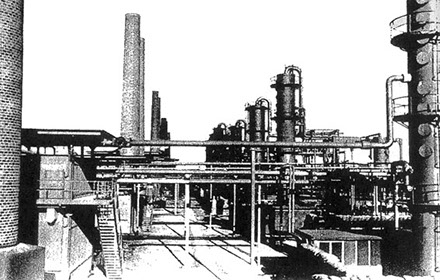The German E-Fuel, or the return of Hitler’s dream

History is made up of courses and recurrences, similar but always different. In an increasingly less democratic and increasingly authoritarian EU, the abandonment of endothermic engines is required, except that they do not use (at least for now, then we will see what happens with bio-fuels) "E-Fuel", fuels generated synthetically and this brings us back to a particularly eventful moment in European history.
The technology for producing synthetic fuels is a century old, so it's far from new. A first patent dates back to 1913 with the Bergius process which transformed coal into synthetic fuel. A second method, which instead started from water and gas, was developed in 1923 by Franz Fischer and Hans Tropsch, the so-called Fischer Tropsh process, or FT. Germany, but not only, invested heavily in these processes to obtain synthetic fuels, part of Adolf Hitler's effort to become autonomous from the importation of liquid hydrocarbons which, in 1936, were 72% imported. In reality, a large part of the German and European energy of the time was obtained without using liquid hydrocarbons, i.e. oil, and in Germany it mainly derived from coal. The amount of oil imported was important, but much lower than at present. The Fueher's idea was simple: given that we have to prepare for a great European war, we need to be autonomous for fuel. The producers of the time, Romania, USA, Iraq and Iran, were under enemy control, potentially hostile or in any case unable to satisfy German needs. The deposits in Italian Libya were unknown (the first to notice them was Italo Balbo, to whom they reported outcrops near Tripoli) and in any case not exploitable without US technologies. Those of the North Sea unknown and in any case not usable.
So the Germans threw themselves headlong into the production of synthetic fuels, which in any case was never sufficient to satisfy the war needs of Nazi Germany. In 1944, when the Soviets occupied Ploiesti, Germany was cut off from any substantial supplies of extracted hydrocarbons and relied only on synthetic fuel plants from which jet fuel, kerosene for aircraft engines, ordinary gasoline, diesel, and other synthetic products such as rubber. As many as 25 plants were built, including the huge ones in Politz (Police, now in Poland you can see an image at the top), produced by IG Farben, i.e. by the current BASF, where almost 30,000 people worked, of which 13,000 died of hardship. Another company very involved in the production of synthetic fuel was Brabarg, which made extensive use of prisoners for the management and construction, or repair, of the plants.
Out of curiosity, in the 1930s Germany invested heavily in chemistry to produce fuel, while we, by hand, invested in gas generator, the process which obtained a fuel gas starting from wood or other fuels with an anaerobic process. Even a gas generator Alfa Romeo 1750 took part in the Mille Miglia.
Obviously the gas generator was a solution suitable for cars and buses, but completely inadequate for the war use to which the Germans were aiming…
The problems with e-fuel, or synthetic fuels, are simple:
- are expensive. The USA produced synthetic fuel in the 1950s to give it up with the lowering of oil prices. In theory the price could even be vaguely comparable, if produced in large super centralized plants and with great use of economies of scale, which brings us to the second and third problems;
- the procedure is certainly not impactful from an environmental point of view, on purpose because it requires huge plants. Unless you want small green plants and pay $240-300 per barrel for fuel, if not more. So no excise duties and therefore no revenues for the States, unless a forced impoverishment of the population is sought;
- a chemical plant of this kind has repercussions on environmental and worker safety that should not be underestimated. Then having small "Green" systems widespread would increase, not reduce, the risk.
In the end, the European E-Fuel is nothing more than a new version of the autocratic dream of autarky that periodically sweeps Europe. I don't see a big step forward between the current green imposition and those of the thirties, if not a change in the uniforms and in the single thought, without a particular advance in its lucidity. We will pay the consequences of this brutal repression of freedom and of the market both from an economic and human point of view.

Thanks to our Telegram channel you can stay updated on the publication of new articles from Economic Scenarios.
The article The German E-Fuel, or the return of Hitler's dream comes from Scenari Economici .
This is a machine translation of a post published on Scenari Economici at the URL https://scenarieconomici.it/le-fuel-tedesco-ovvero-il-ritorno-del-sogno-di-hitler/ on Thu, 30 Mar 2023 09:23:26 +0000.

